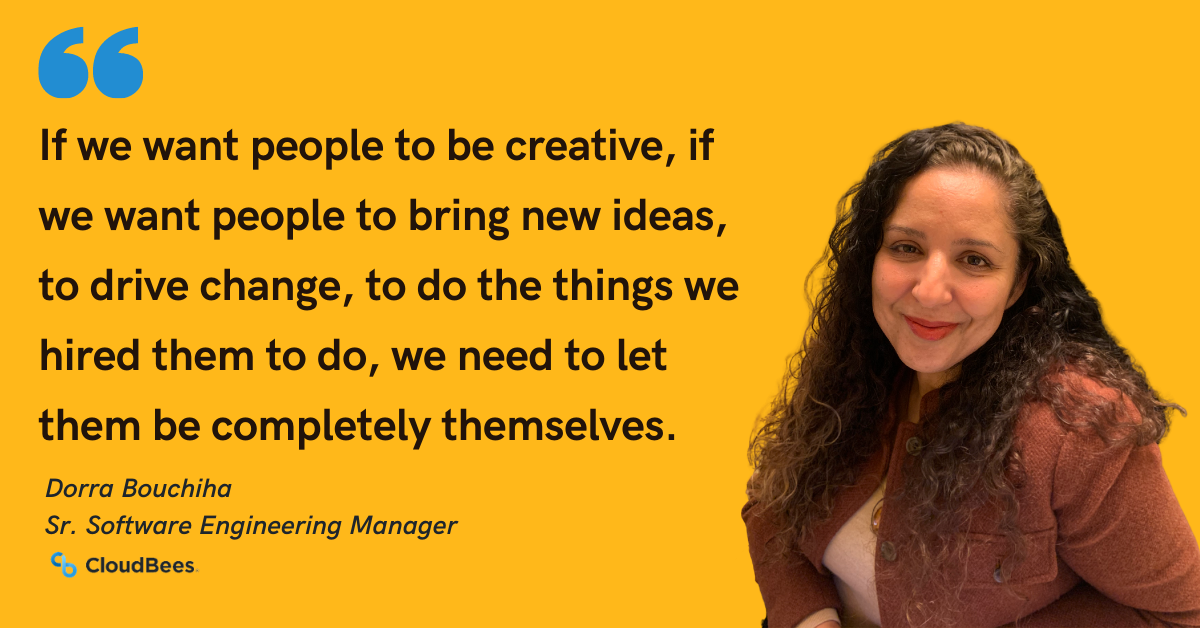Dorra Bouchiha can remember the exact moment she realized she wasn't in control of her own career.
It was summer 2018, and she was sitting at work, watching a presentation by one of her then-employer's new leaders. The presenter was talking about personal growth and showed the room a slide of two images side by side.
On the left was a log in a river being pushed by the current. On the right was a picture of Captain Jack Sparrow looking forward towards the horizon, in charge of his ship.
"He was doing a teambuilding exercise and he asked the room, 'Are you on the left side or on the right side?'" remembers Dorra. "And it didn't take me long to realize, 'Oh, God, I'm a log.'"
Dorra points to that presentation as the moment she realized that she wasn't taking active control of her own career or her life outside of work. She thought about it that summer, including on a family vacation to Paris, and began to brainstorm what she could do about her situation.
"I remembered what my values were. Career is important to me. Family is important to me. And I am important to me. I was out of balance with those last two," reflects Dorra. "And I wanted to rebalance myself, so I started looking for the next stage of my career, the next role that would provide me with what I need for my career."
That's how Dorra found herself at CloudBees, the leader in Enterprise Software Delivery services, as a Senior Software Engineering Manager. We sat down with Dorra to talk about rediscovering her values, figuring out that CloudBees was a place that supported them, and the larger issue of finding a work environment where you can show up as your full self.
First: identify your values
When Dorra was choosing what to study at university, it was fairly easy to follow her gut. She had always been a curious kid, and physics seemed like the natural continuation of that curiosity. "Physics is the place where you understand how things work, from a microscopic level to large structures in the universe. Why is the sky blue? How do computers work? The understanding of all that is what attracted me," explains Dorra.
As she was working on her PhD, at the intersection of theoretical physics and medicine, she tried to play forward what her career in research would look like. "I realized most of my work will be writing grant applications and convincing people of the importance of my work," says Dorra. She wasn't doing enough of what actually interested her—the research—and so, when she finished that degree, she transitioned from academia into software engineering, working with compilers. "Compilers are to software development what physics is to the sciences," explains Dorra. "It's understanding how software works, how hardware works and how we go from a human-readable line of code to machine-executable."
The decision to study physics and the decision to leave academia highlight one key value of Dorra's: continuous learning.
She realized, during that former coworker's teambuilding exercise, that she had gotten away from actively pursuing that value and prioritizing opportunities to fulfill it.
"For the first eight or so years of my career, people would say 'You're good at this. Can you do more of it?' or 'Hey, Dorra, we need someone on this team. Do you want to do this?' And I was more passive. Wherever my leadership and my manager wanted me to go, I went," says Dorra.
Then that log moment happened. "I really wanted to start aligning where I'm going with my personal beliefs and my personal values," says Dorra.
First she had to determine what those were. She started by breaking her life into three components: career, family life, and herself, which includes her spirituality, hobbies, friends, and mental health. She found a few other exercises to be helpful as she built up her picture of what she wanted to do with her life:
- Making a ritual out of personal goals. "We all have business goals," says Dorra. "We sometimes have personal growth goals drafted with our managers, but it's good to do the same exercise for ourselves, taking the time, maybe taking even a separate notebook for that, and really prioritizing those personal goals. Think where you want to go."
- Choosing the values that resonated with her. Dorra went online, found a long list of personal values, printed it out, then went through it and circled the ones that resonated with her. "Nobody has all the values," she says, "but we all have some, and it's not always clear to an individual what they are." You may realize that kindness is really important to you, for example, while excellence is not, explains Dorra.
- Practicing tweet-like journaling. If you have ever thought you were too busy to journal, Dorra is right there with you—and she's figured out a solution. "I write literally tweet-like journals, a very short 140 characters," she says. "I don't have the time to go and say, 'Dear journal, blah, blah, blah.' But just taking those 15 or 30 seconds to say 'Hey, how am I doing? How was today? If it was crappy, what made it crappy?' I find helps me a lot. It's a pulse check. Sometimes you feel in your body when you're stressed, or overjoyed, but you don't take a few seconds to check in with yourself or enjoy that feeling. If you force yourself to journal about it, you acknowledge it."
Working through her goals, values, and the kind of work that energizes her, Dorra settled on three criteria for her next role: it had to be work-from-home friendly, so she could spend an extra hour and a half each day with her family, with her dog, or at the gym instead of commuting; it had to be about digital transformation, since that interested her and she wanted to become a leader in that field; and it had to have a culture of growth, since she wanted to get out of her comfort zone and pick up new skills from talented peers.
Second: find a role that fits with your values
Dorra's research led her to CloudBees, a leader in digital transformation. After a call with an old coworker who was working there and had just convinced his wife to join the company, too, she was sold; it seemed like a great place with an exciting mission, talented employees, and a flexible approach to work that would meet her goals for her next role.
She signed on, and as a Senior Software Engineering Manager, she's currently working on CloudBee's Engineering Efficiency, a new product that helps software engineering teams improve and deliver on their business objectives.
Her current responsibilities are to enable her broader team, ensure their work is aligned with larger strategic goals, put out daily fires, solve future friction points, and develop her team, and Dorra likes how close she's able to be to the work as well as to the people. "Management roles combine that big-picture view that I like with mentoring and coaching and helping others, which are activities I enjoy doing," she says.
Third: if you're somewhere where you can't be yourself, leave
Dorra has found the CloudBees environment to be one that's open to everyone's perspectives and works to create safe spaces for everybody. But that's not how she's always experienced work.
"There were periods of my life where I was in the minority or I was different, and I felt I needed to tone myself down to not be as visible to everybody else. I felt that I needed to dumb down what makes me different. I felt that I was polishing myself too much, watching myself, worrying about what other people think about me, or about what I just said," says Dorra. "And all that mental energy has a cost."
She continues: "If we want people to be creative, if we want people to bring new ideas, to drive change, to do the things we hired them to do, we need to let them be completely themselves."
As a manager, Dorra works to create that inclusivity on her own team by taking the time to really learn about the people working with her and to really listen to their stories. "If it takes three hours, it takes three hours!" she says. She also works to be honest, telling her team when she doesn't know the answer to something or feels overwhelmed.
But for people in situations where they don't feel like their manager knows them, listens to them, or would accept who they really are, Dorra recognizes that their hands may be tied. "In that case, I would say that most of the things that make you uncomfortable being yourself are external and not internal. So it's hard for me to tell someone who doesn't feel they can be themselves to just be themselves, just educate everybody around you to who you are," she says. "If where you are, you cannot be yourself, find a place you can. It's too bad to live eight hours of your day, half of your waking hours, not being who you are."
If working with Dorra and the CloudBees team interests you, check out their open roles.




